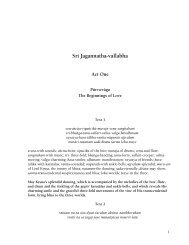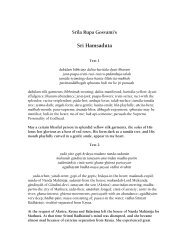Srimad Bhagavatam, Volume 3
Srimad Bhagavatam, Volume 3
Srimad Bhagavatam, Volume 3
You also want an ePaper? Increase the reach of your titles
YUMPU automatically turns print PDFs into web optimized ePapers that Google loves.
the Supreme Brahman as living entity. And do ing this he had to<br />
transcend in the spiritual sky being freed from the blocked sky.<br />
The living being by his material desire to lord it over the maeterial world and<br />
declining to co-operate with the Supreme Lord contact the sum-total of<br />
material world namely Mahat Tatwa and from Mahat Tatwa his false identity<br />
with the material world, intelligence, mind, and the senses are developed all<br />
covering his pure spiritual identity. By the Yogic process as abovementioned<br />
when his pure identity is realised which is known as self realisation then one<br />
has to revert to the original position first by amalgamating the five gross<br />
elements and the subtle elements mind, intellilegence into the Mahat Tatwa<br />
again. Thus eleminating the pure soul from the combined clutches of the<br />
Mahat Tatwa he has to merge in the existence of the Super soul. In other<br />
words he has to realise it that qualitatively he is non-different from the Super<br />
soul and as such he transcends the material sky by his pure identitical<br />
intelligence and thus becomes engaged in the transcendental loving service of<br />
the Lord. This is highest perfectional development of spiritual identity which<br />
was attained by Dhritarastra by the grace of Vidura and the Lord. The Lord's<br />
mercy was bestowed upon him in the matter of his personal contact with<br />
Vidura and when he was actually in practice in the matter of the instructions<br />
of Vidura, the Lord helped him in attaining the highest perfectional stage.<br />
A pure devotee of the Lord does not live in any planet of the material sky<br />
nor does he feel any contact with material elements. His socalled material<br />
body does not exist being surcharged with spiritual current of the Lord's<br />
identical interest and thus he is permanently freed from all contaminations of<br />
the sum-total Mahat Tatwa. He is always in the spiritual sky which he attains<br />
by intercepting the seven-fold material coverings by the effect of his devo<br />
tional service. The conditioned souls are within the coverings whereas the<br />
liberated soul are far beyond the cover.<br />
Dhawasta mayaguna udarko niruddha karanasayah<br />
Nibartita akhila ahara aste sthanur iva achalah<br />
Tasya antaraya maibabhuh samnasta akhila karmanah.<br />
Dhawasta—being destroyed, mayaguna—the modes of material nature,<br />
Udarka—after effects, Niruddha—being suspended, Karanashayah—the<br />
senses and the mind, Nivartita—stopped, Akhila—all, Ahara—food for the<br />
senses, Sthanur—immovable, Iva—like, Ashalah—fixed up, Tasya—his,<br />
Antaraya—hindrances, Maib—neverlike that, Abhu—be, Samnasta—<br />
renounced, Akhila—all sorts, Karmanah—material duties.<br />
He had now suspended all sense action even from the outside and was<br />
completely able of not being distributed by the interaction of the senses<br />
influenced by the modes of material nature. After renouncement of all<br />
sorts of material duties he is now fixed up as immovable and do not<br />
become the source of hindrances on the path.<br />
Dhritarastra had attained by sueh Yogic process the stage of negation from all<br />
sorts of material reaction. The effects of material modes of nature drag the<br />
victim to indefatigable desires of enjoying the matter but they can be stopped<br />
from such false enjoyment by the Yogic process. Every sense is always busy<br />
in searching its food and thus the conditioned soul is embarassed from all<br />
sides without any chance of becoming steady in any pursuit. Maharaj<br />
Yudhisthira was advised by Narada not to distrub his uncle by attempting to<br />
bring him back at home. He was now beyond the attraction of anything<br />
material. The material modes of nature (the Gunas) have their different modes<br />
of activities but above the material modes of nature there is spiritual mode<br />
also which is Absolute. Nriguna means without any reaction. The spiritual<br />
mode and its effect are identical therefore spiritual quality is distinguished<br />
from the material counterpart by the nomenelature 'Nirguna'. After complete<br />
suspension of the material modes of nature one is admitted in the spiritual<br />
sphere and action dictated by such spiritual mode is called devotional service<br />
or 'Bhakti! 'Bhakti' is therefore Nirguna attained by direct contact with the<br />
Absolute.<br />
Sa ba adya tanad rajan paratah panchame ahani<br />
Kalevaram hasyati swam tat cha bhasmi bhavishyati.<br />
Sa—he, Ba—in all probablity, Adya—today, Tanad—From Rajan—oh the<br />
king, Paratah—ahead, Panchame—on the fifth, Ahani—day, Kalevaram—<br />
body, Hasyati—Shall quit, Swam—his own Tat—that, Cha—also, Bhasmi—<br />
ashes, Bhavishyati—will turn into.<br />
Oh the king he shall quit his body most probably on the fifth day from<br />
to—day and that also will turn into ashes.<br />
Narda Muni's foretelling prohibited Yudhisthir Maharaj to go there at the<br />
place where his uncle was staying because even after quiting the body by his<br />
own mystic power Dhritarastra wont be in need of any funeral ceremony<br />
because the indicaton told by Narada Muni was that his body by itself would<br />
burn into ashes without any extraneous effort by any one of his relative.<br />
Perfection of Yoga system is attained by such mystic power: the yogi is able<br />
to quit his body by his own choice of time and can attain any planet he desires<br />
by turning the present body into ashes by self made fire.<br />
13<br />
Thirteenth Chapter - Dhritarastra Quits Home<br />
Dahyamane agnibhir dehe patyuh patni sahotaje<br />
Bahi sthita patim saddhi tam agnim anubekshati.<br />
Dahyamane—while it is burning, Agnibhir—by the fire. Dehe—the body,<br />
patyuh—of the husband, patni—the wife, Sahotaje—along with the thatched<br />
cottage, Bahi—outside, Sthita—situated, Patim—unto the husband, Saddhi—<br />
the chaste lady, Tam—that, Agnim—fire, Anubekshati—look in with great<br />
attention shall enter into the fire.<br />
While observing her husband, from outside, burning in the fire of mystic<br />
power along with the thatched cottage, the chaste lady would enter in to<br />
the fire while looking very attentively.<br />
Gandhari was the ideal chaste lady a life companion of her husband and<br />
therefore while she saw her husband burning in thc fire of mystic Yoga along<br />
with the cottage of leaves, certainly her despair of life could not be described.<br />
She came out of home after losing all her one hundred sons and in the forest<br />
she saw her most beloved husband was also burning. Now she actually felt<br />
alone and therefore entered the fire of her husband and followed her husband<br />
till death. This entering of a chaste lady in the fire of her dead husband is<br />
called Sati rite and the action is cosidered as the most perfect stage for an<br />
woman. In the later age this Sati rite became an obnoxious criminal affair<br />
because the ceremony was forced upon an woman unwilling to become Sati.<br />
In this fallen age it is not possible for any lady to follow the Sati rite as<br />
chastely as it was done by Gandhari and others of by-gone age. A chaste wife<br />
like by Gandhari would feel the separation of her husband more burning than<br />
actual burning in fire. Such lady could observe the Sati rite voluntarily and<br />
there was no criminal force by any one. When the rite became a formality<br />
only and force was applied upon a lady to follow the principle actually it<br />
became criminal and therefore the ceremony was to bc stopped by state law.<br />
This foretelling of Narada Muni to Maharaj Yudrhisthir forbade him to go to<br />
his wtdow aunt even.<br />
Viduras tu tad ascharyam nishamya kurunaudana<br />
Harsa soka yutas tasmat ganta tirtha nishevakah.<br />
Viduras--Vidura also, Tu--but, Tad--that incidence, Ascharyam--wonderful,<br />
Nishamya--seeing, Kurunaudana--oh the son of kuru dynasty, Harsa--delight,<br />
Soka--grief, Yutas--affected by, Tasmat--from that place, Ganta--wend away,<br />
Tirtha--pilgrimage, Nishevakah--for being enlivened.<br />
Vidura also shall go away from that place for being enlivened in sacred<br />
pilgrimages being affected with delight and grief.<br />
Vidura was astonished to see about the marvelous departure of his brother<br />
Dhritastra as a liberated Yogi even though in his past life he was too much<br />
attached to materialism. Off course it was only due to Vidura that his brother<br />
attained such desirable goal of life. He was therefore glad to learn about it.<br />
But he was sorry also that he could not make his brother turn into a pure<br />
devotee. Either this was not done by Vidura on account of Dhrltarastra<br />
becoming too much enemical to the Pandavas who were all devotees of the<br />
Lord. Offence at the feet of a Vaishnava is more dangerous than an offence at<br />
the lotus feet of the Lord. Offence at the feet of the Lord is easily excused by<br />
the Lord Himself but offence at the feet of a devotee is never excused by the<br />
Lord. Vidura was certainly very liberal to bestow mercy upon his brother<br />
Dhritarastra whose past life was too much materialistic. But ultimately the<br />
result of such mercy certainly depended on the will of the Supreme Lord in<br />
the present life therefore Dhritarastra attained liberation only and after, many<br />
such liberated state of life one can attain to the stage of devotional service.<br />
Vidura was certainly very mortified for the death of his brother and sister in<br />
law and the only remedy for mitigating such lamentation was to go out to<br />
pilgrimage and thus Maharaj Yudhisthira had no chance to call back Vidura<br />
his surviving uncle.<br />
Iti uktma atha aruhat swargam naradah saha tumburuh<br />
Yudhisthira vachas tasya hridikritwa jahat suchah.<br />
Iti--thus, Uktwa--having addressed, Atha--thereafter, Aruhat--ascended,<br />
Swargam--outer space, Naradha--The great sage Narada, Saha--along with,<br />
Tumburuh--his string instrument, Yudhisthira--Maharaj Yudhisthira, Vachasinsiructions,<br />
Tasya--of his, Hridi--keeping in the heart, Jahat--gave up,<br />
Suchah--all lamentations.<br />
After trying all these the great sage Nsrada along with His string<br />
instrument Tumburu got up in the outer space and Yudhi sthira keeping<br />
his instrucrions at heart was able to get rid of all lamntations.<br />
Sri Naradaji is an eternal spaceman having been endowed wlth spiritual body<br />
by the Grace of the Lord. He can travel in the outer space of both the material<br />
and spiritual worlds wlthout any restriction and can approach any planet<br />
within the unlimited space and that also within no time. We have already<br />
discussed about his previous life of being the son of a maid servant but on<br />
account of his association with pure devotees he was elevated to the position<br />
of becoming eternal spaceman and has freedom of movement. One may<br />
therefore try to follow the foot prints of Narada Muni instead of making futile<br />
effort for reaching other planets by mechanical means. It is not possidle to<br />
reach even the nearest planet Moon by such mechanical means. Maharaj












